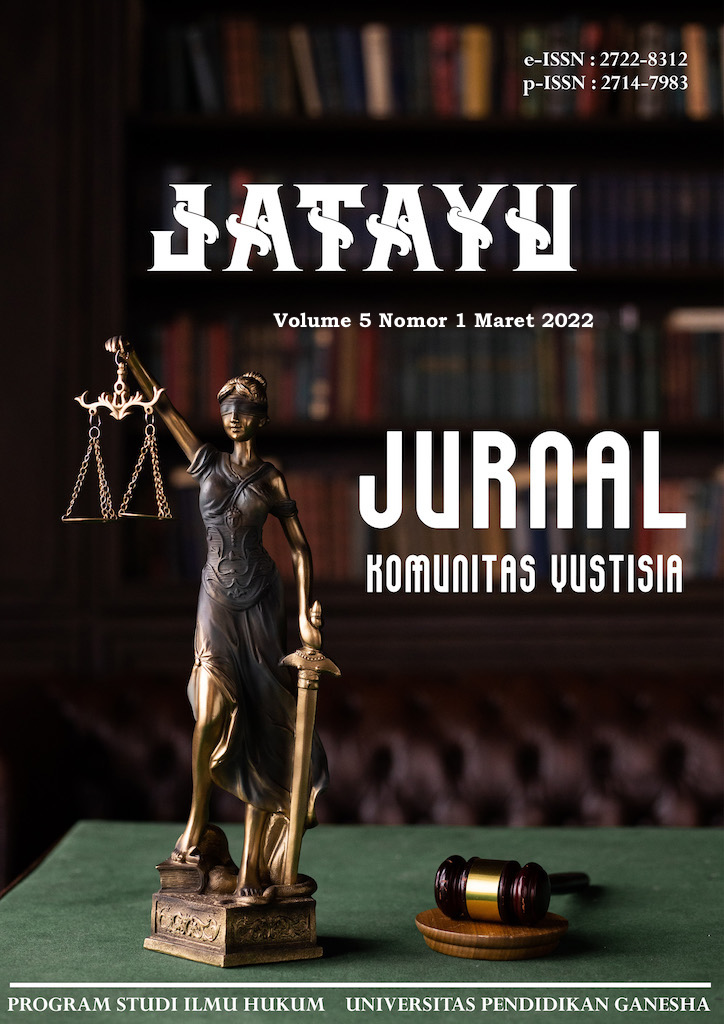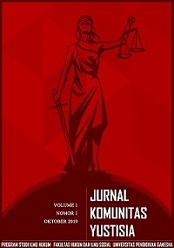PERAN INDONESIA DALAM PENYELESAIAN SENGKETA INTERNASIONAL DI LAUT CINA SELATAN
DOI:
https://doi.org/10.23887/jatayu.v5i2.51616Keywords:
Indonesia, Sengketa, Laut Cina Selatan.Abstract
Penelitian ini bertujuan untuk (1) mengetahui dan menganalisa faktor penyebab terjadinya sengketa di Laut China Selatan dan (2) untuk mengetahui upaya pemerintah Indonesia dalam penyelesaian sengketa Internasional di Laut Cina Selatan. Adapun jenis penelitian yang digunakan adalah penelitian hukum normatif, dengan menggunakan pendekatan perundang-undangan, pendekatan kasus, dan pendekatan konseptual. Bahan Hukum yang digunakan yaitu bahan hukum primer, sekunder, dan tersier. Teknik pengumpulan bahan hukum menggunakan teknik penelitian kepustakaan. Teknik analisis bahan hukum yang digunakan yaitu teknik deskriptif. Hasil penelitian menunjukan bahwa (1) penyebab sengketa di Laut China Selatan adalah wilayah Laut Tiongkok Selatan terjadi karena adanya wilayah perebutan kepentingan ekonomi, strategi, dan politik oleh negara-negara tersebut. Konflik \\\\\\\\\\\\\\\\\\\\\\\\\\\\\\\\\\\\\\\\ yang terjadi tidak hanya bersifat bilateral, namun menjadi konflik multilateral, termasuk konflik yang diakibatkan oleh pelaku non government aktor yang memanfaatkan eksplorasi dan eksploitasi sumber daya alam di Laut Tiongkok Selatan. Adapun faktor penyebab sengketa terjadi adalah a. Banyak sumber daya seperti gas, terumbu karang dan lainnya sehingga beberapa negara yang terlibat berusaha mengklaimnya, b. Karena ketidakjelasan mengenai pengeklaiman Cina atas Laut Cina selatan karena bertentangan dengan ZEE beberapa negara seperti Malaysia dan Brunei Darusalam. c. Adanya pulau-pulau kecil seperti Natuna dan Spartly yang mempengaruhi ZEE negara terlibat. (2) lalu upaya pemerintah Indonesia yaitu dengan adanya dua faktor yaitu mengenai faktor militer dan faktor ekonomi diharapkan menjadi media bagi pembangunan kepercayaan yang dapat digunakan Indonesia untuk melanjutkan proses penyelesaian sengketa. Kini, target yang perlu dicapai Indonesia hanya satu, yaitu mewujudkan aturan main di Laut China Selatan.
Downloads
Published
Versions
- 2022-10-24 (2)
- 2022-08-26 (1)
Issue
Section
License

This work is licensed under a Creative Commons Attribution-ShareAlike 4.0 International License.
Authors who publish with this journal agree to the following terms: Authors retain copyright and grant the journal right of first publication with the work simultaneously licensed under a Creative Commons Attribution License that allows others to share the work with an acknowledgement of the work's authorship and initial publication in this journal. Authors are able to enter into separate, additional contractual arrangements for the non-exclusive distribution of the journal's published version of the work (e.g., post it to an institutional repository or publish it in a book), with an acknowledgement of its initial publication in this journal. Authors are permitted and encouraged to post their work online (e.g., in institutional repositories or on their website) prior to and during the submission process, as it can lead to productive exchanges, as well as earlier and greater citation of published work (See The Effect of Open Access). Authors who publish with this journal agree to the following terms: Authors retain copyright and grant the journal right of first publication, with the work [SPECIFY PERIOD OF TIME] after publication simultaneously licensed under aCreative Commons Attribution License that allows others to share the work with an acknowledgement of the work's authorship and initial publication in this journal. Authors are able to enter into separate, additional contractual arrangements for the non-exclusive distribution of the journal's published version of the work (e.g., post it to an institutional repository or publish it in a book), with an acknowledgement of its initial publication in this journal. Authors are permitted and encouraged to post their work online (e.g., in institutional repositories or on their website) prior to and during the submission process, as it can lead to productive exchanges, as well as earlier and greater citation of published work (See The Effect of Open Access).






